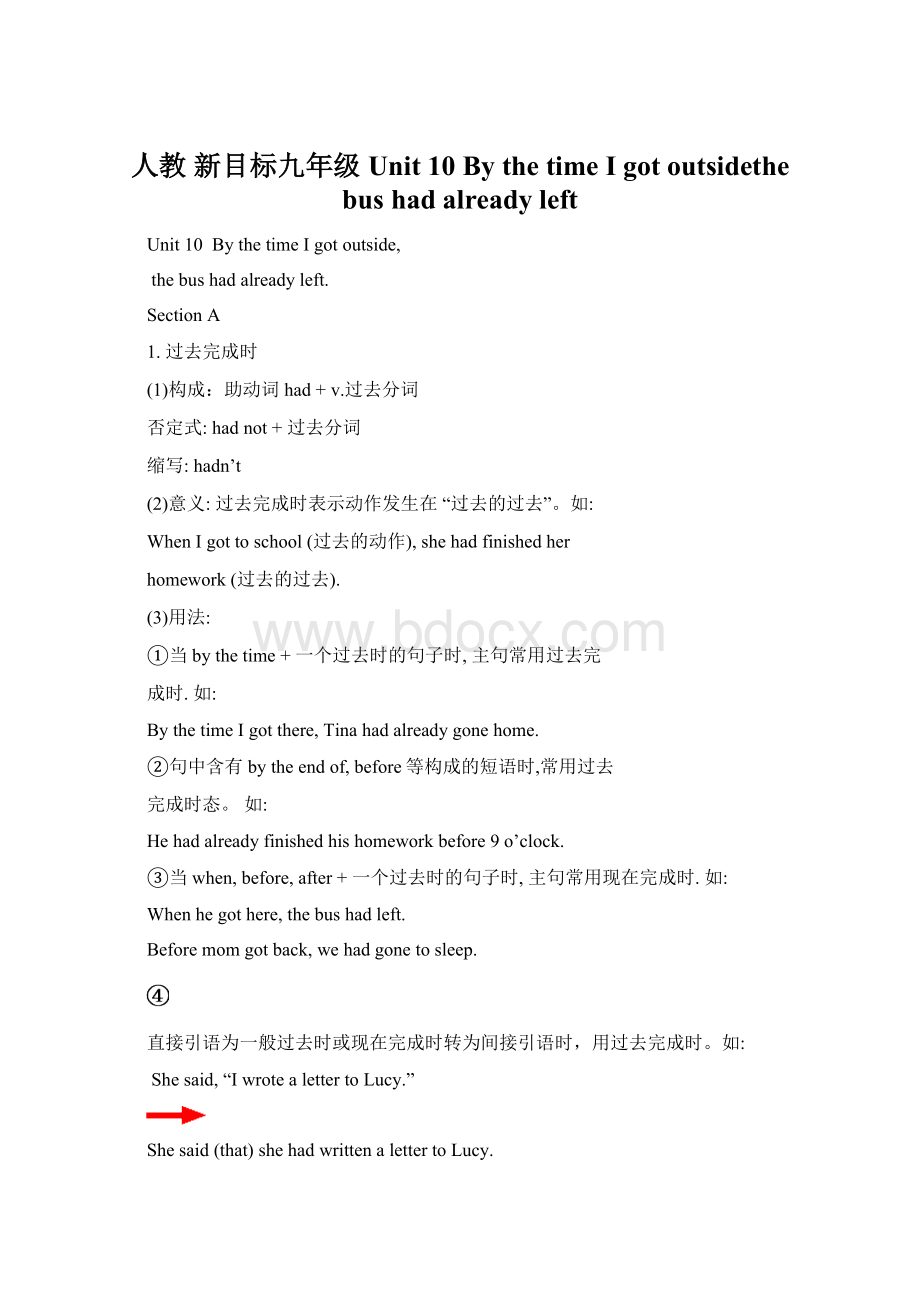人教 新目标九年级Unit 10By the time I got outsidethe bus had already left.docx
《人教 新目标九年级Unit 10By the time I got outsidethe bus had already left.docx》由会员分享,可在线阅读,更多相关《人教 新目标九年级Unit 10By the time I got outsidethe bus had already left.docx(8页珍藏版)》请在冰豆网上搜索。

人教新目标九年级Unit10BythetimeIgotoutsidethebushadalreadyleft
Unit10BythetimeIgotoutside,
thebushadalreadyleft.
SectionA
1.过去完成时
(1)构成:
助动词had+v.过去分词
否定式:
hadnot+过去分词
缩写:
hadn’t
(2)意义:
过去完成时表示动作发生在“过去的过去”。
如:
WhenIgottoschool(过去的动作),shehadfinishedher
homework(过去的过去).
(3)用法:
①当bythetime+一个过去时的句子时,主句常用过去完
成时.如:
BythetimeIgotthere,Tinahadalreadygonehome.
②句中含有bytheendof,before等构成的短语时,常用过去
完成时态。
如:
Hehadalreadyfinishedhishomeworkbefore9o’clock.
③当when,before,after+一个过去时的句子时,主句常用现在完成时.如:
Whenhegothere,thebushadleft.
Beforemomgotback,wehadgonetosleep.
直接引语为一般过去时或现在完成时转为间接引语时,用过去完成时。
如:
Shesaid,“IwrotealettertoLucy.”
Shesaid(that)shehadwrittenalettertoLucy.
Hetoldhismother,“Ihavehadbreakfast.”
Hesaidtohismother(that)hehadhadbreakfast.
也可通过上下文暗示来判断是否该用现在完成时.
Exercises:
1).We_____(learn)7unitsbytheendoflastmonth.
2).We_____(arrive)atthestationbeforeteno’clock.
3).Hesaidhe___never___(see)suchanexcitingmatchbefore.
4).Bythetimethepolicebegantocatchhim,he____(go)toanotherplace.
5).He_____(finish)hisworkwhenitwasdark.
6).I______(be)herebeforehecamehere.
2.bythetime到…时候,到…之前,指从过去某一点到从句所示的时间为止,常引导一个一般过去时的从句,主句则要用过去完成时。
如:
Bythetimewegottohishouse,hehadfinishedsupper.
He____already____(leave)bythetimeIgotthere.
3.leavesth.sw.把某物忘在某地
Unluckily,Ileftmybookathome.
forgetsth.忘了某事
forgettodosth.忘了做某事
---Sorry,Ileftmyhomeworkathome.
---Itdoesn’tmatter.Butdon’tforgettobringittoschooltomorrow.
1).Sheisverycarelessandoften____things.
2).Yesterdayshe____herkeysathomeagain.
leaveamessage(forsb.)(给某人)留言
IoftenleaveamessageformydaughteronthetablewhenIcomeout.
leaveforsw.=gotosw.动身去某地
TheyareleavingforBeijingnextweek.
4.getbacktosw.返回某地(sw.为副词时省去to)
5.start/begindoingsth.=start/begintodosth.开始做某事
6.belateforschool=come/gettoschoollate上学迟到
beneverlateforschool上学从不迟到
7.Icameveryclose.我差点迟到了.
在这里close是副词意为“靠近地,接近地”
e.g.Helivesclosetotheschool.
close还可以做形容词“近的,亲密的”
Iregardyouasmyclosestfriend.
8.gooff
(闹钟)闹响;
离去,走掉
9.wakeup醒来
wakesb.up叫/唤醒某人
e.g.1).Ioftenwakeupat6:
00inthemorning.
2).Heistootired,pleasedon’twakehimupnow.
10.waitforsb.todosth.等待某人做某事
e.g.1).Youcan’twaitotherstohelpyou,youshoulddoitbyyourself.
2).Allthestudentsarewaitingforme___(sing)asong.
11.comeout
出来
出版
(花儿)开放不能用在被动语态中
e.g.1).Look,thesechildrenarecomingoutofthebuilding.
2).Mynewbookcameoutlastmonth.
3).Flowerscomeoutinspring.
12.rushout(of)冲出…
rushto/into冲到…/冲进…
runoff跑掉;迅速离开
runofftothebusstop跑向车站
Thebabyranofftohismotherwhenhesawher.
13.take/haveashower洗澡
takeaquickshower
=takeashowerquickly快速地洗澡
14.have/eatbreakfast吃早餐
15.ontime按时准时intime及时
gettoschoolontime按/准时到校
16.comeby从旁边经过
e.g.Icamebythebankjustnow.
17.givesb.aride让某人搭便车/带某人一程
e.g.Heoftengivesmearidetoschool.
I___________whenIsawTomwalkingalonetheroad.(带他一程)
HeaskedmetogetonhiscarwhenIwaswalkinginalonelystreet.
=He____________whenIwaswalking….
18.onlyjust刚刚好,恰好
19.Ionlyjustmadeittomyclass.我恰好赶上上课.
makeit
①约定时间
Let’smakeitat8:
00.
=Let’smeetat8:
00.
②按时到达
Thetrainwillleaveintenminutes.SoIthinkwecanmakeit.火车十分钟后开,我想我们能赶上。
③做到,办成功
Believeinyourself,andyou’llmakeit.
能出席,能到场
I’msorry.Iwon’tbeabletomakeitonSaturday.
20.breakdown(车,机器等)出毛病,出故障,不运转
breakoff(突然)中断
e.g.1).Themachinebrokedown.
2).Mycomputerhasbrokendown,itdoesn’tworknow.
3).Ourbus____onthehalfwaybecausethegasranout.
A.brokeupB.brokedown
C.brokeawayD.broke
SectionB
1.be/getdressed(in+颜色)穿(…颜色的)衣服
dresssb./oneself给某人/自己穿衣服
wear=bein…穿着,戴着(状态)
puton穿上(动作)
dressup穿上盛装乔装打扮
dressupas打扮成….样子
e.g.1).Heis/getsdressedinblacktoday.
2).Thebabyistooyoungtodresshimself,sohismomoftendresseshim.
3).MyuncledressedhimselfupasFatherChristmas.
4).Shedressedupforaparty.她盛装参加宴会。
5).It’scold,putonyourcoat.
6).Ilikewearingascarfinwinter.
2.showup出席;露面
e.g.Shedidn’tshowuplastnight.昨晚她没有出现.
showsb.sth.=showsth.tosb.给某人看某物
showsb.around…带某人参观…
beonshow=beondisplay展览
3.sth.happentosb.某人发生了什么事
happen不能用在被动语态中
1).Youlooksleepy,whathappenedtoyou?
2).Therearemanypeopleinthestreet,Idon’tknowwhatis
happening.
3).Unluckily,atrafficaccidenthappenedtohim.
4).Shehopednothingbadwouldhappentohim.
happentodosth.碰巧做某事
①Ihappened___(meet)youruncleinthestreetyesterday.
②What___youyesterday?
A.hashappenedtoB.happenedto
C.happenedD.washappenedto
4.onAprilFool’sDay愚人节那天
onChildren’s/Women’s/Teachers’Day
onthefarm
5.invitesb.todosth.邀请某人做某事
invitesb.toaparty.邀请某人参加聚会
Thanksforyourinvitation.
=Thanksforaskingme.谢谢你的邀请。
6.landn.陆地;国土
v.靠岸;登陆
landon在…上登陆
Thosesoldiers___asmallislandinEastSea.
A.landedB.landedonC.jumpedD.ranto
7.so…that…如此…以致于…
such…that…如此…以致于…
区别:
somany,somuch是固定搭配
such不能这样用
so后接形容词,副词
such后的中心词是名词
sointerestingabook
=suchaninterestingbook
1).Hehas___muchworktodo___hecan’tgototheparkwithus.
2).Thatis___aninterestingbook___Ihavereadittwice.
3).Theboywas___tired___hefellasleepverysoon.
4).Hereis____deliciousfoodonthetable___Iwanttohaveataste.
5).Hewassocleveraboythatheislikedbyusall.
=Hewas_________boythatheislikedbyusall.
常考点:
Heissoyoungthathecan’tgotoschool.
=Heistooyoungtogotoschool.
=Heisnotoldenoughtogotoschool.
TheboxissoheavythatIcan’tcarryit.
=Theboxistooheavy(forme)tocarry.
=Theboxisn’tlightenough(forme)tocarry.
8.setoff激起;引起
9.fleefrom…=runawayfrom…从…逃走…
fleeto…逃到…
10.as…aspossible=as…asonecan/could尽可能…
e.g.1).ReadasmanybooksasyoucanifyouwanttolearnEnglishwell.
2).Heisalwaysdoingeverythingascarefullyashecan.
3).Wemustgetasmuchknowledgeaswecan.
11.sellout卖完,售完(sell,sold,sold)
e.g.Thesebookssellverywellandtheyhavebeensoldoutalready.
12.marrysb.娶某人;嫁给某人
get/bemarriedtosb.与某人结婚
bemarried结婚可与一段时间连用
e.g.1).HemarriedJohn’ssister.
=HegotmarriedtoJohn’ssister.
2).Areyoumarried?
3).Theyhavebeenmarriedforfiveyears.
13.ahappyendingn.结局,结尾
14.both…and…两者都;既…又…
作主语,谓语动词用复数;
1).BothLilyandLucyhavebeentoBeijing.
=NotonlyLilybutalsoLucyhasbeentoBeijing.
2).Bothmyfatherandmymotherareteachers.
=Notonlymyfatherbutalsomymotherisateacher.
反义词组:
neither…nor…两者都不;既不…也不…,作主语,谓动词临近
NeithershenorIamright.